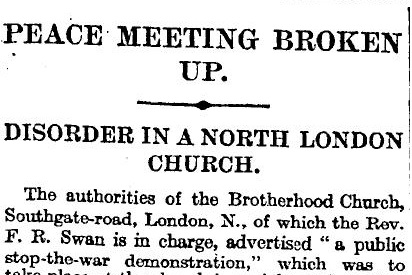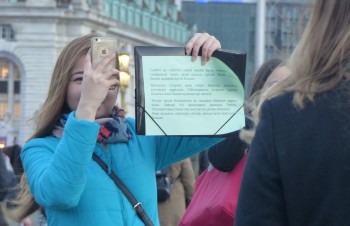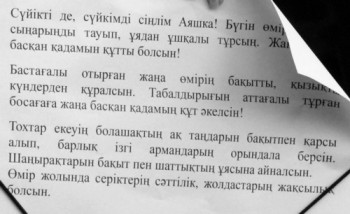We are developing the social individualist meta-context for the future. From the very serious to the extremely frivolous... lets see what is on the mind of the Samizdata people.
Samizdata, derived from Samizdat /n. - a system of clandestine publication of banned literature in the USSR [Russ.,= self-publishing house]
|
In 1916, the Reverend Swan of the Brotherhood Church in Hackney held (I kid you not) a “Stop the War” meeting. It did not go well.
Trouble was forseen by the police
Now, why would that be?
…the first hymn was sung. Then the trouble began.
…soldiers and civilians rose in a body and denounced the cha’rman [sic] and his companions as traitors.
[The vicar’s supporters] tried to drown the opposition by singing “The Red Flag”…
Oh yeah?
…but the public voice was stronger and carried the day with “Keep the home fires burning.”
Those were the days.
…some one began throwing down Chinese crackers. Hand-to-hand struggles became common all over the floor of the church. A man, who said he was wounded at Neuve Chapelle and had been invalided out of the Service, stood up on a seat in the centre of the building and pointing at the little crowd of young men, asked why they were not in khaki.
The vicar abandoned the proceedings but the crowd did not.
…a resolution demanding that the war should be carried on with all vigour until Germany had been beaten was carried with cheers.
When I first read this article, I assumed this meeting was the doing of some wooly-headed cleric. Not so. The Brotherhood Church’s other great claim to fame was that in 1907 it hosted the 5th Congress of the Russian Social Democratic Labour Party (General Secretary, one V. I. Lenin). And, in case you were wondering, no, they were not duped.
You’d need a heart of stone not to laugh.
 The Times 17 January 1916 p5
Ever since the universe obliged me by inventing digital photography, I have been taking a lot of photos (only click on that if you really want to see some of my photos and are willing to wait). One of the sorts of photos that I like to take a lot of is photos of other people taking photos. I particularly like it when they are holding something in front of their face, like a camera or a coat or a bag, so that I can then stick my photo of them photoing up on the internet without them being very recognisable, by which I mean face-recognition-software-recognisable.
And earlier this month, I took this photo, of a lady on Westminster Bridge, taking a photo of another lady. Well, that’s what I at first thought, but later I realised that she was almost certainly videoing the other lady. That’s because in addition to holding up her iPhone (over most of her face) she was also holding up a hand-made teleprompter, covered in text:

I did a few months of schoolboy Russian about half a century ago, so I am pretty sure that this is Russian. But what does it say?
Here it is closer-up and more easily readable, with the blueness removed:

So, is this harmless tourist guidance? Viciously mendacious Putinite propaganda, full of nonsensical lies about the Ukraine? Some kind of personal message? I have enjoyed wondering, but now I would really like to know.
I am sure that at least one of our most knowledgeable and obliging commentariat can knowledgeably oblige with the answer.
If Stalin was 75 percent violence and 25 percent propaganda, Putin is 75 percent propaganda and 25 percent violence.
– Peter Pomerantsev, from “Nothing Is True and Everything Is Possible: The Surreal Heart of the New Russia”
The shooting down of a Russian military aircraft, by Turkey, allegedly after it passed into a sliver of Turkish airspace during a mission over northern Syria might well be an isolated incident, like Gadaffi’s clashes with the US Navy over the Gulf of Sidra in the 1980s. For me, I hear an ironic but distorted echo of the shooting down of the Korean Air flight 007 by the Soviets in 1983, when it was 90 seconds from international airspace after passing briefly through Soviet airspace, but that was a civil flight and a clear case of Soviet mass murder.
Whatever happened may not become clear, but why it happened is for now, even murkier.
Was it a ‘gambit’, like a pawn sacrifice (the eternal lot of the military) in chess to gain a strategic advantage, a pretext to escalate the situation or to force others hands?
Was the shooting down a provocation by a resurgent Erdogan, confident in his election victory, expecting to shield from Russia behind NATO?
Was it Russian testing of Turkish resolve, or vice versa?
Did both sides hope for a crisis too good to waste?
Is Russia hoping to drive a wedge between Turkey and the rest of NATO, expecting the wetter elements to take fright and use the ‘Polish veto’ of NATO?
Is Russia hoping for a prolonged spike in the oil price to boost its economy, and distract the hard-pressed masses from their troubles and toils?
Or was it just a trigger-happy pilot?
And what would be the best outcome for the West from this tragedy?
The upshot of the Syrian refugee crisis, and the recent terrorist attacks in Paris almost seems as they were 1960s KGB/GRU operations designed to sow discord within Europe and to set countries against each other and élites against the people, with Putin having dusted down an old plan and re-worked it. But is that not over-complicating matters?
Cowardice is the main and the worst sin on Earth. Betrayal is a personal form of cowardice… All of your propaganda is working excellently. Most of the Russian population believes what they are saying: Putin is great. There are fascists in Ukraine. Russia is never wrong. There are enemies everywhere… But I also understand that there are people who are smarter—such as you, for instance, here—who support the government. You perfectly well understand that there are no fascists in Ukraine. That Crimea was annexed illegally. That your troops are fighting in Donbas… These are facts that are on the surface… the troubadours of your regime… know everything as it is, but they continue to lie. Just as you continue your work, finding some sort of rationalization within yourself. Probably, they also rationalize to themselves: “We have to feed our children; we have to do something.” But, guys, what is the point of raising another generation of slaves?
– Oleh Sentsov
[Putin] is not an easy man … But I don’t think there is any substitute other than constant engagement.
– Hillary Clinton
I would like to think she means an endless conveyor belt of ATGWs and artillery ammunition so that the Ukrainian Army can keep Putin’s assorted employees under ‘constant engagement’. But I think she might actually mean doing nothing very much other than exchanging LOLcats and Vines daily via unsecured e-mail.
Bell¿ngcat has proven to be a thorn in the side of the Kremlin by debunking claim after claim about what it happening in the Ukraine. Just take a look at their latest tour de force, in which they compare Ukrainian and Russian claims about Flight MH17 and demolish the Russian Ministry of Defence’s case.
The internet is a truly marvellous thing.
A Russian minister has paid an unannounced visit to Norwegian owned Svalbard, much to the Norwegian government’s annoyance.
But said Russian minister also seemed to be suggesting Norway does not really have sovereignty over Svalbard. However that is not really what the Svalbard Treaty says, not that the Kremlin is known for worrying over much about such niceties.
First Deputy Chairman of the State Duma Committee on International Affairs Leonid Kalashnikov contested the full sovereignty of Norway to Svalbard. Norway previously demanded an explanation after a visit to the archipelago Deputy Prime Minister Dmitry Rogozin, who is part of the EU sanctions list
Under the Svalbard Treaty the peninsula is not supposed to host bases but is not actually ‘demilitarised’ as such, so now might be a nice time for the Norwegian army to send a company on an extended posting up north.
Rather than engaging Russia in a futile pre-modern discourse about race and ethnicity, Ukrainians should integrate into multicultural, multiracial, tolerant Europe.
As for Russia, it would have done a lot better if after the collapse of the Soviet Union it had declared itself a new nation, born on the day it rose up to defeat the hardline communist coup in August 1991. Had it started from a blank page, the way the United States did in 1776, it might have freed itself of its damaging 19th century imperial hangups.
– Alexei Bayer
When the Kremlin says something like this…
In an interview in the newspaper Jyllands-Posten, the Russian ambassador to Denmark, Mikhail Vanin, said he did not think Danes fully understood the consequences of joining the programme.
“If that happens, Danish warships will be targets for Russian nuclear missiles,” Vanin told the newspaper.
What exactly are people supposed to hear? What I am hearing is…
“Yes I know you would rather spend your taxpayer’s money on outreach programmes for gay radical muslim single parent transgendered climate change threatened whales, but we really really want you to get those defence budgets up to the NATO required 2% figure!”
What reaction are they expecting to overt threats pretty much explicitly saying “if you, as a NATO nation, assist NATO with the deployment of a defensive weapon system within NATO borders, we will point nukes at you!”
Might this not be a tad counter-productive when the Russian Troll Army are tirelessly trying to convince assorted useful idiots to push the line that “Russia is no threat to anyone, honest guv!”…?
I guess the the Russian ambassador to Denmark did not get the memo 😉
One of the oddities (well, it may not be that odd) of our time is when people who wax lyrical about liberty or the evils of oppression of certain kinds seem to be, well, rather weak at the knees when certain “tough guy” rulers flex their muscles in ways that seem hard to justify by reference to any sort of principle other than naked territorial aggression.
And sometimes defenders of these “tough guys” (or women) are so appalled at what they see as the behaviour of the “other side” in a dispute (such as the European Union or the current leadership of much of the West) that they want to make excuses for such tough guys’ actions, often excusing behaviour that one might assume they would, in other cases, condemn or at least question. . There has been a fair amount of “we had it coming and you cannot really blame X or Y since they were were brutalised by us” sort of thinking long before 9/11. (People sometimes excused Germany’s aggressions in the 1930s by invoking Versailles in a knee-jerk fashion, and for all I know, the Ancients were indulged in similar ways.)
A recent example of this sort of behaviour comes from Peter Hitchens, a columnist who, for those who haven’t encountered him before, is almost self-parodic in his scolding right wingery. (He’s the brother of the late Christopher Hitchens). Peter Hitchens is a lapsed Marxist and I sometimes wonder just how deep any conversion away from that intellectual foolishness has ever taken place. Anyway, it appears Mr Hitchens has big man love for Vladimir Putin, so to speak:
Col. Putin, he says, is at odds with the West because he feels unloved. By us, that is. This is an injustice Peter has set out to correct, sticking out for his bit of rough. Vladimir, according to his swain Peter, is like a murderer who, according to his lawyer, only killed because his Mummy was a whore, he never knew his Daddy and the flat-screen TV set in his room was only a 19-inch.
Thus the object of Peter’s affection is only raping the Ukraine the way he previously raped Chechnia, Georgia and his own people because “We have been rubbing Russia up the wrong way for nearly 25 years.” Had we been rubbing Russia up the right way, Col. Putin wouldn’t be murdering everyone he dislikes, including, incidentally, dozens of Peter’s Russian colleagues. He wouldn’t have blown up blocks of flats in his own country to provoke aggression against Chechnia. He wouldn’t have turned Russia into a giant crime syndicate. And he wouldn’t have waged nuclear war in London by using polonium to murder Litvinenko.
This broadside comes from some fellow called Alexander Boot, of whom I had not heard before. Judging by some other postings, I suspect I won’t be in much agreement with Mr Boot about a lot of issues, but he’s right here.
Some weeks ago, when the issue of Russia’s activities vis a vis the Ukraine came up, one commenter sniffed that we libertarians should not be so beastly about Russia, since for all its brutality/corruption/etc, that we must focus our efforts more on Islamic fanaticism, and that Russia, because of its brutality under Col Putin, was a sort of useful, if rather unwholesome, ally. I don’t fully buy that analysis on even the most hardnosed basis, and on a more highminded view, think that genuine defenders of liberty and justice should raise the bar a bit. Part of the dislike of the Putin regime and what it represents on my part comes from a disappointment in what now holds sway in Moscow. It could and should have been far better than this. Much better.
Like so much electronic chaff dropped out of the back of a Tupolev bomber to confuse an incoming heat-seeking missile, the idea that there are multiple interpretations of the truth has become the founding philosophy of state disinformation in Putin’s Russia, designed to confuse those who would seek out the truth with multiple expressions of distracting PR chaff. The tactic is to create as many competing narratives as possible. And, amid all the resultant hermeneutic chaos, to quietly slip away undetected. It is a tactic straight out of Mr Putin’s KGB playbook from the 1970s. Generate a plurality of narratives, so the truth can be obscured.
– Guardian editorial. Yes I know, chaff only confuses radar-guided missiles, you need flares for heat-seekers, but hey, this is the Guardian after all. Mangled metaphor aside, this is a very good editorial that will enrage all the right people.
|
Who Are We? The Samizdata people are a bunch of sinister and heavily armed globalist illuminati who seek to infect the entire world with the values of personal liberty and several property. Amongst our many crimes is a sense of humour and the intermittent use of British spelling.
We are also a varied group made up of social individualists, classical liberals, whigs, libertarians, extropians, futurists, ‘Porcupines’, Karl Popper fetishists, recovering neo-conservatives, crazed Ayn Rand worshipers, over-caffeinated Virginia Postrel devotees, witty Frédéric Bastiat wannabes, cypherpunks, minarchists, kritarchists and wild-eyed anarcho-capitalists from Britain, North America, Australia and Europe.
|






